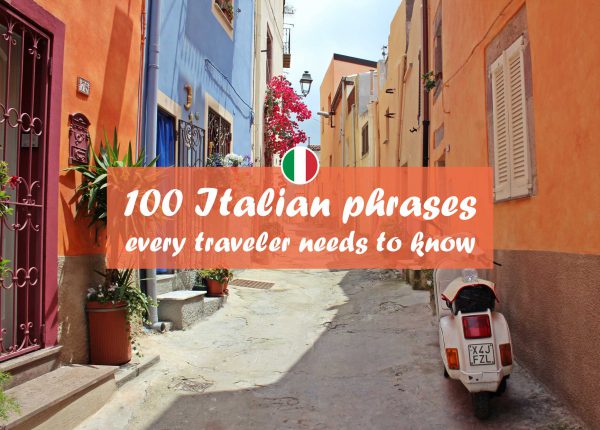How to say Hello in Italian: Top 10 Italian Greetings
Here are multiple different ways to say "hello" in Italian. Because greetings should always be no. 1 on your list of priorities when traveling abroad.
Do you want Italians to take you as one of their own? Use these expressions. 🤌

When in Rome, do as Romans do, and use Italian slang words and expressions. No, really. If you’re learning the language and want the full Italian experience, Italian slang is a great way to get it. Slang and even expressions are like the “secret code” of a language, so they can make you feel right at home when you use them. Moreover, if you aim to learn Italian – and truly master it – you should embrace it all: slang words, expressions, idioms, and proverbs. So, let’s dive in!
These are some of the most common Italian expressions you’ll encounter while in Italy. They are unique, humorous, and expressive – just like Italians themselves! I mean, who would have expected Italians to have an expression about pizza that means ‘boring’ when pizza is everybody’s favorite thing ever?
Before we move on, you need to understand that expressions, sayings, phrases, and idioms is that they are the salt and pepper of any language, not just Italian. And the best ones are, of course, those unique to the language you are learning. Why? Because they are the shortcut to making you sound more fluent.
What’s your favorite Italian expression so far? Here’s a quick tip: sprinkle these expressions throughout your conversations without exaggerating. While using them can give the impression that you were born in Italy, overdoing it might come across as a bit unnatural. And it goes the same for Italian slang words!

Cavoli amari literally translates to “bitter cabbages” in Italian but refers to a tough situation or impending problems. Interestingly, Italians frequently mention cabbages! For instance, cavoli miei (“my cabbages”) implies something is your personal business that others shouldn’t meddle with.
When you’re clueless about something or you don’t know what to say, in Italian, you can simply say “boh!”. This one is quite similar to the Italian expression che ne so! meaning “how should I know?”.
There’s no denying that Italians are experts in expression. For example, the Italian expression “dai!” can be used in three quite different contexts. And if you are wondering how that is possible, well, it’s all about the correct use of intonation, mimics, and Italian hand gestures.
Literally “slipper-man”. Italian slang pantofolaio refers to someone who prefers to stay home in their slippers rather than go out. Do you recognize yourself in this description? A pantofolaio is basically the Italian equivalent of “couch potato”.
“To throw the package”. Contrary to what some may think, this has nothing to do with the delivery man. Instead, it means to stand someone up. So, Italians don’t just skip a meeting or a date, they “throw the package”.
Scialla is an Italian slang word that has become very popular lately, thanks to Gen Z. It basically means “to relax”, “to chill out” or to “keep calm”. It is generally used as an encouragement to “don’t worry”.
There’s a 2011 movie with the same name in case you’re looking to expand your Italian slang word repertoire further.
Mostly used by younger people, this Italian slang word is the equivalent of “cool”. If you want to say that something is extraordinary, fantastic, or cool, in Italian you would say figo or che figata.
Additionally, figo (or figa for women) can also be used to say that someone is very attractive. For example, Brad Pitt è un gran figo translates to “Brad Pitt is very attractive”.
Sbronza is for everything related to alcohol as it essentially describes the state of intoxication resulted from consuming it. Are you having a sbronza? It means you have a hangover.
If you have to convey the meaning of being drunk in a more formal setting, you would definitely not use sbronza. Instead, you would use terms like ubriachezza (“drunkness”) or intossicazione alcolica (“alcohol intoxication”).
Casino in Italian has nothing to do with gambling because it is literally a “brothel”. So, this Italian expression actually means “what a mess!” and is used to describe a situation that’s a bit out of control, confusing, or crowded.
Beccarsi is an Italian slang verb that comes from beccare, which literally means “to peck”. However, in slang or informal language, beccarsi has several meanings depending on the context. The most common is “to meet” or “to catch up” with someone. For example, Ci becchiamo dopo la scuola? translates to “Shall we meet up after school?”.
Americanata is a playful jab, not to be taken offensively, used to describe something absurdly grandiose, extravagant, or exaggerated, reflecting a humorous observation of American culture.
These Italian expressions with deep meaning are essentially proverbs you can use to add a layer of sophistication to your Italian conversations. Our advice is to employ these expressions as you would in your own language: sparingly. However, ensure you introduce them at the perfect moment when their wisdom can shine and make the most impact.

| Italian slang words and expressions | Translation | Comments |
|---|---|---|
| Hai voluto la bicicletta? E adesso pedala! | You wanted the bicycle? Now ride it. | the Italian equivalent of “you made your bed, now lie in it” |
| Raga | Guys | refers to a group of young people |
| Che figata! | How cool! | another way to say figo |
| Figurati | It’s nothing | it can also be used to express surprise or disbelief: “Imagine that!” |
| Mi raccomando | Please, mare sure to… | it can also mean “remember” or “don’t forget” |
| Acqua in bocca | Keep it a secret | literally “water in your mouth” |
| Non avere peli sulla lingua | To speak your mind | literally “to not have hair on your tongue” |
| Speriamo bene | Let's hope for the best | can also mean “fingers crossed” |
| Magari | I wish/If only | used to express hope for something that is not very likely to happen |
| Che schifo! | How disgusting! | an exclamation used to express strong dislike or disgust |
| Alla romana | Roman-style | it refers to splitting the bill equally |
| Essere al verde | To be broke | literally “to be at the green” |
| Sfigato | Unlucky | often used to describe someone who is a loser in a light-hearted way |
| Essere in gamba | To be capable/competent | literally “to be in leg” |
| Costare un occhio della testa | Very expensive | literally “to cost an eye out of the head” |
| Ficcanaso | Nosey person | it refers to a meddlesome person |
| Meno male | Thank God | literally “less bad” |
| Rompere le scatole | To get on someone’s nerves | literally “to break the boxes” |
| Che barba | How boring | literally “what a beard” |
| Hai fatto la scoperta dell’America | You discovered America | used sarcastically |
| Tanto par cambiare | So much for change | depending on your tone, it can either be sarcastic or serious |
In conclusion, Italian slang and expressions are more than just linguistic flourishes; they are key to truly experiencing Italian culture. By judiciously incorporating them into your conversations, you not only enrich your language skills but also deepen your connection with Italy’s rich heritage. Remember, the goal is to sprinkle these expressions like seasoning – enough to enhance but not to overpower. This careful balance will not only make your speech more authentic but also open doors to more meaningful interactions. Ciao!
Before you go, make sure you check out these FAQs.
Yes, using slang is okay when speaking Italian, as it can make your conversations more natural and show familiarity with the culture. Just make sure you’re mindful of the context and the company you’re in.
You can learn more Italian slang on the Mondly blog, from Italian movies and TV shows, social media, and online forums frequented by fluent speakers.
You can use Italian expressions confidently in conversation by practicing. First, start by incorporating a few expressions into your conversations and pay attention to the reactions you get.Then, immerse yourself in Italian media to understand the context and usage of these expressions naturally. The more you practice and learn, the better you will be at using Italian expressions in your conversations.
Try Mondly, the award-winning language app that is serious about making learning Italian fun.
Instead of tiring yourself for hours with inch-thick textbooks, slip a 10-minute Mondly lesson into your routine and make learning a breeze. You will learn Italian naturally using:
Start using Mondly for free on your computer or download the app and learn Italian anytime, anywhere.

Here are multiple different ways to say "hello" in Italian. Because greetings should always be no. 1 on your list of priorities when traveling abroad.

From zero to cento, mille and beyond, let’s see how fast can you master the Italian numbers. It’s easier than you think!

Planning a long-awaited vacation to Italy? Learn these 100+ Italian phrases now and take your traveling experience to the next level.